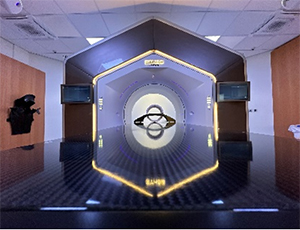Precise Cancer Treatment: Medical Center - University of Freiburg Relies on Two of the Most Modern Linear Accelerators in the World

At the Medical Centre - University of Freiburg, two linear accelerators of the latest generation have been put into operation for the first time in Germany. Extremely fast high-resolution 3D imaging enables even more precise treatment of cancer patients.
Since the end of July 2024, two linear accelerators of the latest generation have been in clinical use at the Department of Radiation Oncology at the Medical Centre - University of Freiburg – for the first time in Germany. Patients benefit from their use in several ways: the computed tomography (CT) imaging, which is based on novel detector technology, provides high-resolution 3D images within a few seconds before each treatment session.
On this basis and supported by artificial intelligence, the radiation plan can be adapted in a few minutes and thus daily with millimeter precision. This is particularly important when tumors and particularly sensitive, movable organs are close together or the position of the target tissue changes. The first of the two linear accelerators went into operation exactly one year ago. More than 500 patients have already been successfully treated with it.
“With the two linear accelerators, we can offer our patients radiation therapy at the highest level worldwide,” says Prof. Dr. Anca-Ligia Grosu, Medical Director of the Department of Radiation Oncology at the Medical Centre - University of Freiburg.
High-resolution images with just one held breath
With the new devices, holding one’s breath just once is enough to obtain high-resolution CT images. The scan takes merely six seconds. “With other linear accelerators, it takes more than a minute to create CT images like these. In addition, the spatial resolution and contrast of the new devices are significantly higher than before, and thus almost equivalent to conventional computed tomography,” explains Prof. Dr. Dimos Baltas, head of the Division of Medical Physics at the Department of Radiation Oncology at the Medical Centre - University of Freiburg. According to Prof. Grosu, “Advances in technology are making examinations and treatment much more comfortable and precise for patients.”
Due to their speed and precision, the ETHOS™ linear accelerators from Varian, a subsidiary of Siemens Healthineers, enable online-adaptive radiation treatment planning. This involves calculating a new radiation plan for each session that takes into account the current anatomical conditions. In certain situations, this procedure can enable more precise and less invasive treatment.
“Imaging of such high precision and at such high speed directly before radiation treatment allows us to adjust the radiation treatment precisely every day. This way, we can further increase the quality of treatment and significantly improve the therapy,” Prof. Grosu is pleased to report. Until now, CT imaging for radiation therapy treatment planning was done just once before the start of treatment.
The linear accelerator also rotates five times faster than conventional accelerators, which in turn opens up new possibilities for further optimizing the therapy, namely to attack the tumor to the maximum extent while at the same time sparing the risk structures and the surrounding tissue to the maximum extent.
The Department of Radiation Oncology is the first in Germany to use two of these latest-generation radiation therapy systems. “We are convinced that the combination of empathy and experience with technical and medical progress offers patients the best prospects. This is what we offer here at the Medical Centre - University of Freiburg,” Prof. Grosu says.
Back